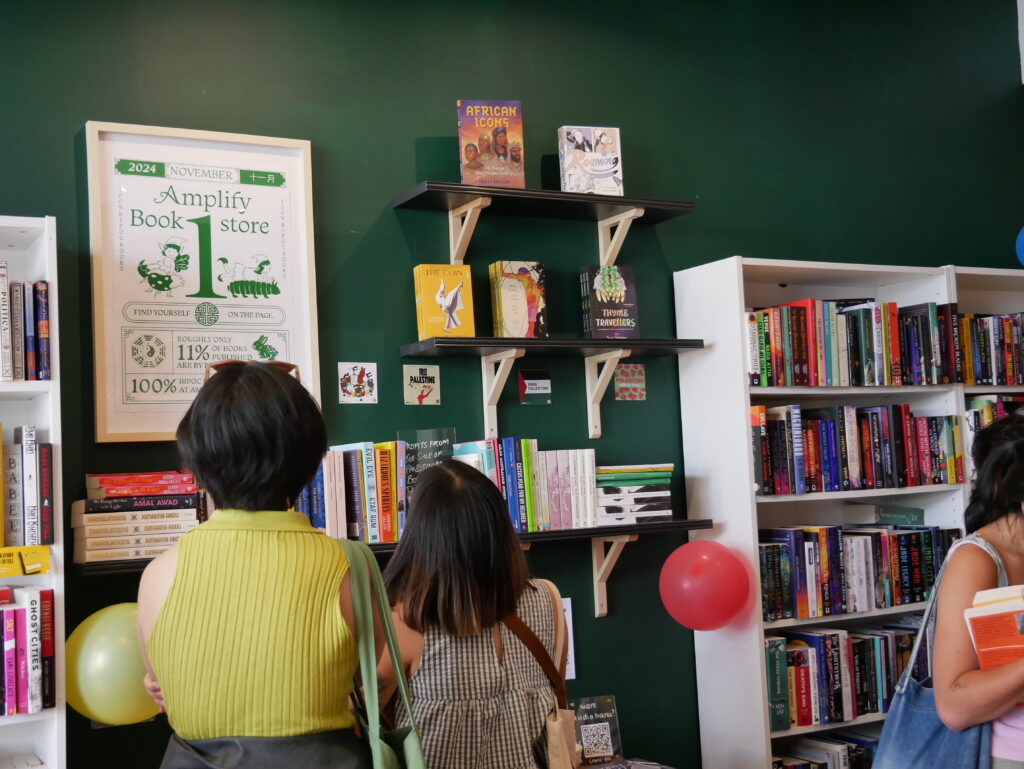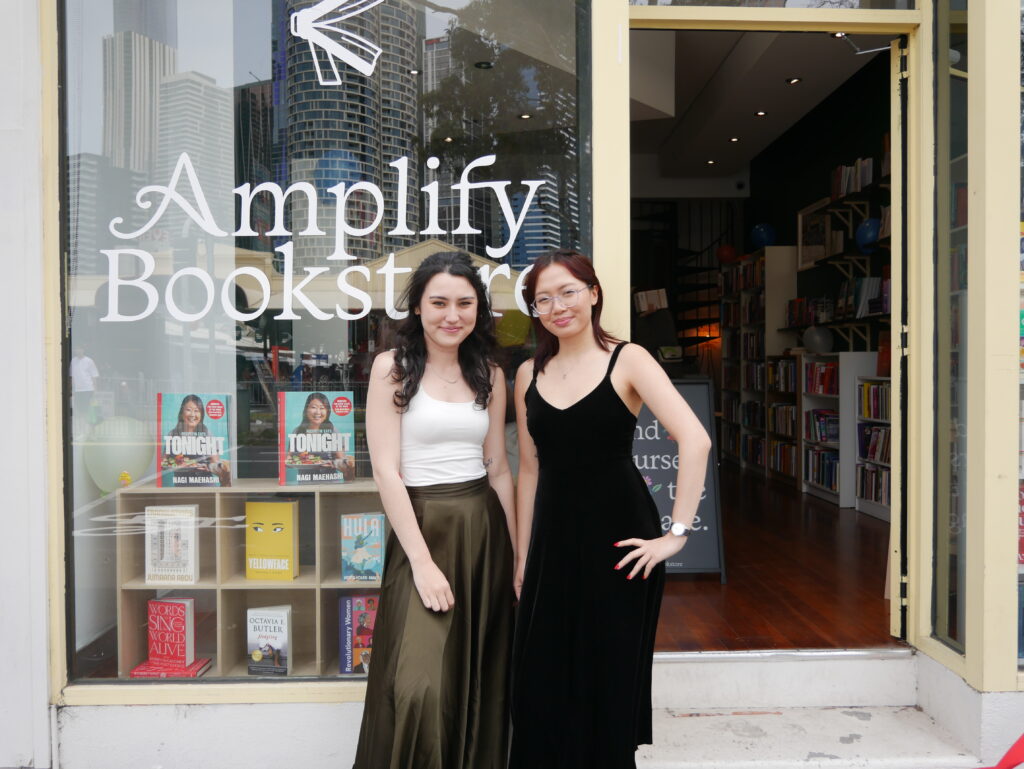It’s hard to imagine a venture like Amplify Bookstore being based out of Australia. After all, this country doesn’t have the best track record for diversity in media.
It is precisely this gap that pushed Marina Sano and Jing Xuan Teo to create Amplify Bookstore, an online shop that exclusively stocks books written by BIPOC authors. “They don’t have to fight for a space on the shelf… with us, every book is a book by a person of colour,” says Xuan.
It’s crucial work, not just for Australian booksellers and their readers. According to a 2023 survey, 72.5% of the workforce of the U.S. publishing industry is white. This is after the five biggest global publishing houses pledged to increase diversity in 2020, in the wake of the murder of George Floyd and the Black Lives Matter movement that came closely after; in the end, the BIPOC workforce only increased by 3.5%. Locally, statistics are harder to discern – a 2022 D&I survey found that 86% of those surveyed were born in a western country, but this doesn’t account for second and third generation Australians or otherwise. This translates to about only 10% of Australian books released being penned by a BIPOC author.
Amplify’s main aim is to change this. That there are issues across incumbent publishing houses, from who actually makes decisions about what books are considered ‘worthy’ of publication to the level of consciousness from staff about race and diversity, is clear, and worthy of further research and attention. Initially conceived as a fresh publishing house to address some of the limitations they were observing, Marina and Xuan quickly pivoted to a bookstore as they felt it would have more impact.
“We could have made a book if we really tried,” Marina says. “But it would have been one book a year at best, between the two of us. Whereas with a bookstore, we can supply so many people with so many different things.”

Amplify works not just as a bookstore but a directory for anyone who wants to diversify their bookshelf. On their website, you can sort books not just by genre, but also by the ethnic origin of the author. Their catalogue is extensive, covering every continent in the world, bar Antarctica. Click into their tag directory and you’ll find even more tags – historical fiction is separated into time period and identity is further categorised into specific racial intersection (eg. Afro-Brazilian), side by side with everyone’s favourite romance tropes.
It also helps Marina and Xuan function almost as librarians, being able to find specific recommendations based on customer requests. “We try to make everything as searchable as possible,” Marina says. “If you’re looking for a book with bisexual rep[resentation], or if you’re looking for a book about ‘x’ Indigenous nation, if we have it, it’ll be tagged and available for you to find, and it works as a catalogue for us, too.”
In 2020, Marina and Xuan were studying their masters of publishing at the University of Melbourne – “proud owners of a Zoom University Masters,” jokes Xuan – two of the very few people of colour in a mostly white cohort. Both were drawn to the field through a love of reading – and, for Xuan, watching The Bold Type – but the outlook became bleak very quickly. Their lecturers advised them to apply the skills they learnt in their degree in other industries.
“They tell you this when you do the masters,” Xuan says. “They were like, ‘This industry sucks. It’s so old and it’s baked in tradition, and the culture is really bad.’ It was so grim.”
Having met while working on Myriad Magazine, the People of Colour department’s student publication, Marina and Xuan became each other’s support network against the many microaggressions they faced in their classes. Marina notes that her classes were representative of how monolithic the industry she would go on to experience was.
“Oh my lord, we were reading The Heart of Darkness [by Joseph Conrad] and everyone was like, great book,” she remembers. “It was in a post-colonial global literature class, and I was one of two people of colour in the room, and me and the other girl were like ‘this is nuts’.”
Marina had already spent time researching representation in media, both in high school and her undergrad, but a new public awareness of anti-racism in 2020, and a willingness from non-black people to read more about it, had her and Xuan, then still in the first semester of their masters, thinking about what more they could do. There was a changing of the guard in publishing at the time, at least in the U.S – the deaths and retirements of prominent executives and tastemakers coinciding with wide criticism of the industry’s lack of diversity meant people of colour, especially Black women, were now taking on leadership roles in droves. Online, reading lists about race and culture went viral, making bell hooks and Ibram X. Kendi a white household name. This was the climate in which Marina and Xuan conceived Amplify Bookstore.

“Amplify was birthed out of the audacity that you can have at 21,” Xuan says. “When you want to do something, you do it and don’t think it through very much.”
Marina laughs. “There was a little bit more thought than that, to be fair to us.”
Early conversations with major booksellers bore no fruit. Most mentors were white and deeply entrenched in the traditions of the Australian publishing industry. Marina recounts, “When we came to them with the idea of the bookstore – which we weren’t kidding around about, we wanted literal steps to get it done – their advice was that it wasn’t feasible, there was no market, and that we shouldn’t do it.
“Which was, A., really disheartening and, quite frankly, racist,” she adds, “And B., not what we were asking for.”
Instead, with all the free time afforded to them by the Melbourne lockdowns of 2020 and 2021, they turned to university tutors with industry connections, Google, and small business TikTok. Xuan admits it was a lot of trial and error. “We didn’t know what it would take to run a business, but we were really married to the idea.”
Since conception, Amplify Bookstore has been a team of two, starting with Xuan on the media side and Marina handling what she calls the “nuts-and-bolts business stuff”. With the help of Marina’s dad, they started with enough money only to set up a website and buy their first batch of books. Their logo was designed with the help of Xuan’s sister, and the ‘thank you’ cards that come with every delivery were designed by Marina’s high school friend. Until recently, the store’s entire stock was held at Marina’s house.
With no physical location and no money for advertising, they turned to social media. Instead of focusing on merely advertising their business, however, they modelled their strategy after the flourishing community on ‘BookTok’, with quick reviews, book lists, and the occasional jab at the publishing industry with the help of trending audio.
No other bookstore was doing it like them. “We run our social media in a weird intersection of being an influencer and being a brand,” Xuan explains. “But not in the unhinged Duolingo way.”
Marina nods. “It’s always about promoting the actual mission.”
Part of the mission is also community-building, vital to the more activist element of their work and which has helped the store last in the long term. Putting a face behind the brand means their customers know who they’re supporting and what they stand for, and it sets them apart from bigger booksellers like Booktopia and Dymocks.
Says Xuan, “The community we’ve built, I’m really proud of it. It’s people who share the same vision as us.”
The two-way conversation has helped them further curate their stock. Customers keep them updated on author controversies that may affect whether they want to continue platforming them.
“We’re really conscious of the impact we have and what we’re trying to achieve,” Xuan explains.
The feedback they’ve received from this community has been overwhelmingly positive. Marina says that the positive comments always come when she needs them most. “It’s very affirming and just, like, cosy to have people go out of their way to let us know that [Amplify] does matter and it does mean something to them.”
At the core of their mission has always been the desire to make a difference. Amplify’s activist origins remain to this day; soon after the events of October 7th 2023 Marina and Xuan increased their stock of Palestinian authors and posted book recommendations to social media. All profits from the sale of Palestinian books went to Palestine Australia Relief and Action; in under six months, they donated over $3,000.
Also important to them is their environmental impact.
“We really care about running a business that is for the people and for the planet, as much as you can when you’re running a business. I mean, books are made out of paper, unfortunately,” she continues, “And sometimes you do question if a tree dying was worth it.”
“Also, to clarify,” Marina adds, “E-readers? Not necessarily any better.”
Xuan nods, pointing out how much energy the data storage would take. “Anyways, there is no good way to live,” she concludes.
“There’s no ethical consumption under capitalism, but…” Marina began, and Xuan finished her sentence: “You can try.”
While both insist that they don’t expect to become the next Amazon, Amplify has seen a sure and steady growth in popularity from the start. After a few successful physical pop-ups across 2024, Amplify is finally ready to move out of Marina’s bedroom into a dedicated physical space. From November 1, customers will be able to visit Amplify Bookstore three days a week at a prime location opposite Queen Victoria Market in Melbourne Marina and Xuan are hoping it brings a new type of reader.
“Because we’re online, we have a more specific audience” Marina says, “We sell a lot of literary fiction, a lot of memoirs, and then – this is a really poor way to put it, sorry – whatever is hot in social justice spaces.”
“A lot of books that are popular online, you can’t really get at our store,” Xuan explains, “But I guess we’ll see how it changes when we open in person. We don’t sell illustrated very well, like graphic novels and cookbooks.”
The mention of cookbooks has Marina exasperated. “We have a lot of cookbooks! We have so many wonderful cookbooks!”
A few weeks shy of their fourth anniversary, Xuan and Marina agree that starting Amplify was, while ballsy, the right decision for them.
“Every time we’re in person, someone will come up to us to say that they appreciate what we’re doing,” Marina says.
“Marina wants to be complimented on,” Xuan butts in. “It’s the only reason we’re opening an in-person store.”
“It’s not that! It’s just that it’s so easy to forget that you’re doing something for people.”
“Bookselling is weirdly fulfilling,” Xuan concedes. “We’re living our dream.”


